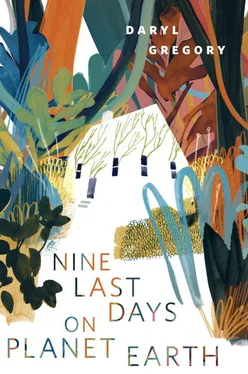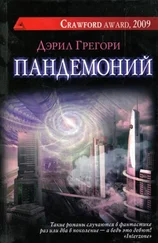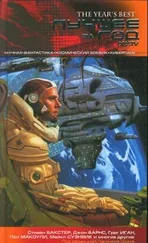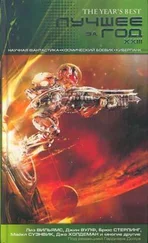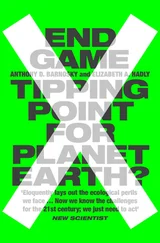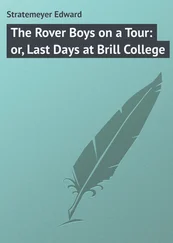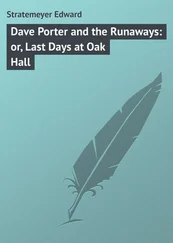Hale said, “Look.”
In the distance, a dark, churning cloud. Light flashed at the edges of it like tiny lightning. Hale ran toward it, into the wind. They plunged through a line of trees, into the next field—and suddenly the cloud loomed over them. Thousands of glistening tumbleweeds, most the size of a fist, a few big as soccer balls. A sudden downdraft sent scores of them plummeting into the trees. Most stuck in the treetops, others bounced down into the undergrowth, and half a dozen ricocheted back into the air and spun toward them.
“Grab one!” Hale shouted. He pulled his T-shirt over his head in one quick move. His back was pale and muscled. LT felt a sudden heat and looked away, his heart pounding. Then Hale swung the shirt over his head, trying to snag a thistle ball. It floated just out of reach. He chased it, then jumped, jumped again. LT couldn’t take his eyes off the way his shoulders moved.
Then a lucky gust sent the ball down and the shirt caught against it. Hale hooted and LT cheered. The thing was hollow, a jumble of flat, silvery blades, thin as the wings of a balsa-wood glider, connected to each other by spongy joints which were decorated with thorns. Hale pulled his shirt free of them, and the cloth tore.
Then the sun dimmed, and they looked up. LT realized they’d only seen the front of the cloud, the first wave. Thousands and thousands more flew toward them, a spinning mass.
LT said, “Ho-lee shit.”
This struck Hale as hilarious, and then LT was laughing too, so hard he could barely stand. Then they ran, giggling and shouting.
1981
For months before his summer stay, when he was sixteen years old, LT begged his mother to take him to see the dragon tails of Kansas. Mom worked slow magic on her new husband, Arnaud, a thin, balding, control freak who made a lot of money as a chemical engineer. Eventually Arnaud came up with the idea that he should encourage LT’s interest in science and take them all to visit the most successful invasives in the Midwest. He rented an enormous RV and they drove southwest.
The first sign of the invasion came just past Topeka, when road crews waved them off the interstate. Arnaud eased the RV into the parking lot of a McDonald’s and said, “There you go.”
LT walked out of the RV, into sunlight and heat. At the edge of the lot rose an arch of deeply grooved bark. It emerged from the broken cement and came down about fifteen yards away in a field. Large purple leaf blades ran in single file atop the bark like the plates of a stegosaurus.
LT looked back at his mother. She beamed at him, then shooed him forward. He grabbed hold of the sturdy roots of the blades and pulled himself onto the base of the arch. A few careful steps more and he was upright, hands out for balance. The bark was a bit wider than his foot, but uneven. He knew from his books that the tail was not an ordinary trunk, but vines that had twisted around each other as they grew, only gradually adhering to share resources.
He reached the peak of the arch, eight feet off the ground. Twenty or thirty yards away, directly in front of him, another arch emerged, and another, like a sea monster coursing through an ocean of grass. No, one monster in a school of them. To either side, dozens and dozens of the dragon tails breached and dove. A group of them had burst up through the highway, and there was nothing manmade cement could do to keep them underground.
These were the aliens’ favorite trees, he thought. How could they not be? They were living architecture.
His mother called his name. She held the fancy, big-lensed camera Arnaud had bought her. She didn’t have to prompt LT to smile.
* * *
The last night of the vacation, Arnaud drove to a campground set among the dragon tails, a farmer’s feeble attempt to recoup something from the land after agricultural disaster. As they ate dinner at the RV’s tiny table, LT showed his mother pictures from one of his books about the invasives. He told her how the dark fans held chlorophyll-like molecules that absorbed a larger spectrum of light than the Earth versions. “If our plants tried to process that much energy they’d burn up, like a car engine trying to run on rocket fuel.”
“It’s a bit more complicated than that,” Arnaud said. He stood at the galley sink, washing the skillet he’d used to fry the hamburgers. “The photosystems they’re using seem to be variable, sometimes like retinol in archaea microbes, sometimes more like chlorophyll with novel sidechains added, so that they can control—”
“Take a look at this,” LT said, cutting him off. He showed her a cross section of the dragon tail, and how the vines were twisted around each other. “They call them golden spirals. See, there’s this thing called the Fibonacci sequence—”
“Dragon tails follow the golden spiral?” Arnaud said. He came over to the table. LT was pleased to know something the chemist didn’t.
Mom said, “What’s a Fibonacci?” and LT quickly answered. “It’s a series of numbers, starting with one, two, three, five… each one’s the sum of the previous two numbers, so—”
“That’s a close approximation of the golden ratio,” Arnaud said. He pulled the book closer, leaned over LT’s mother. “The growth factor of the curve follows that ratio. You can see the spiral in nature—in seashells, pine cones, everywhere.”
“So beautiful,” his mother said. She ran fingers over the glossy cross section. “Like the head of a sunflower.”
LT, suddenly furious, pushed himself out from behind the table. His mother said, “Where you going?”
Arnaud said, “Could you put away your plate?”
He let the door bang shut behind him.
Outside, the atmosphere was greenhouse humid. He marched away, not caring which direction his body took him. It was nine thirty and still not full dark, as if the sun couldn’t find the edge of these tabletop plains. The air was heavy with a floral perfume.
He came to the leaping back of a dragon trail, black against the purpling sky, and walked beside it. Gnats puffed out of the grass and he waved them away.
It had been a mistake to come on this trip. The RV was as stifling as a submarine. Arnaud sucked up all available oxygen, inserted himself into every conversation.
Eventually the dark came down, and he aimed for the fluorescent lights of the cinder-block building that doubled as park office and convenience store. Inside, a couple kids about his age, a boy and a girl, were glued to the Space Invaders cabinet. Were they brother and sister? Boyfriend and girlfriend? He thought about talking to them. He could tell them things. Like how the speed of the game was an accident; the aliens came down slow at first, then got faster and faster as their numbers were destroyed, not because it had been programmed that way, but because the processor could only speed up when the load lightened. Telling things was the only way he knew how to make small talk. Other forms of conversation were a mystery.
He bought a Coke and took it outside. Leaned against the wall under the snapping bug zapper.
A flashlight bobbed toward him out of the dark. He ignored it until a voice behind the light said, “Hello, my darlin’.”
His mother stepped up, clicked off the flashlight. “Did you see the stars? They’re amazing out here.”
“Still no meteors,” he said. Six years after the seed storm, everybody was waiting for a second punch. Or maybe the next wave was on its way now, in the void, creeping across the light-years. Perhaps the long delay was necessary because of orbital mechanics. What looked like design could be just an accident of the environment.
He offered her a sip of his Coke. She waved it off. “You ought to give him a chance. He’s just enthusiastic about things. Like you are.”
Читать дальше
